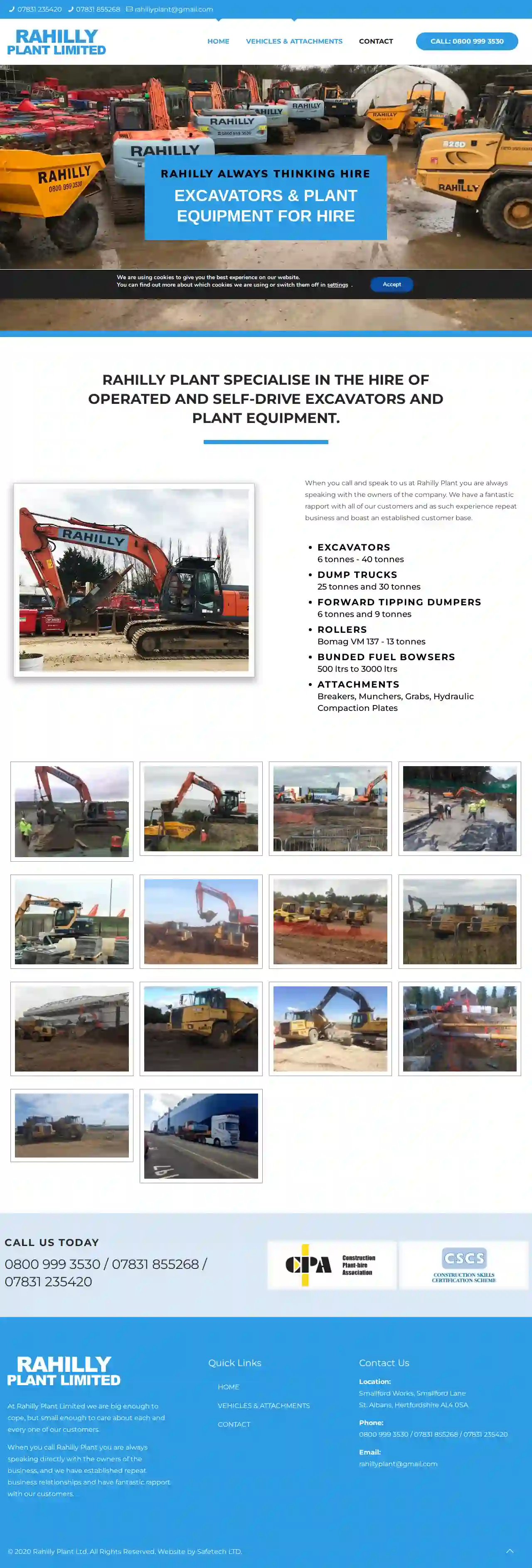Excavation Contractors Cheam
Top Excavation Services in Cheam
Get up to 3 Excavation Companies quotes for your project today! Compare profiles, reviews, accreditations, portfolio, etc... and choose the best offer.

Rahilly Plant Ltd
55 reviewsSmallford Works, Smallford Lane, St. Albans, AL4 0SA, GBRahilly Plant: Your Trusted Partner for Excavator and Plant Equipment Hire Rahilly Plant specializes in providing high-quality operated and self-drive excavators and plant equipment for hire. We are a family-run business with a strong commitment to customer satisfaction. When you call Rahilly Plant, you're always speaking directly with the owners, ensuring personalized service and a deep understanding of your needs. We pride ourselves on our fantastic rapport with our customers, which has led to a loyal and growing customer base. We are dedicated to providing reliable equipment and exceptional service, making us the go-to choice for your construction and excavation projects. At Rahilly Plant, we are big enough to handle your project, but small enough to care about each and every one of our customers. We are committed to building long-term relationships based on trust and mutual respect.
- Services
- Why Us?
- Gallery
Get Quote
Clive Charles Construction
3.73 reviews31A Frogmore, Park Street St Albans, St Albans, AL2 2NG, GBINSPIRE, CREATE, DELIVER Clive Charles is a proven established Prime Residential/fit-out contractor with over 35 years of delivering the utmost quality. With an extensive portfolio of successfully completed projects, including the finest Listed period buildings to cutting edge contemporary residences throughout London and the UK. From concept to completion, Clive Charles maintain close relationships with the client and appointed team working collaboratively to fulfil all project objectives striving to exceed the highest expectations. "With over 30 years experience in the super prime refurbishment market, we deliver quality with efficiency and pride."
- Services
- Why Us?
- Gallery
Get Quote
Linnets Construction
51 reviewsSutton, GBAbout Us Linnets Construction is a family-run business with over 30 years of experience in building and landscaping services. We are committed to providing reliable, knowledgeable, and meticulous service to our clients. We offer free surveys, advice, and quotations to ensure you have all the information you need to make informed decisions about your project. Where we're based We are based near St Albans and also cover areas such as Harpenden, Luton, Hatfield, Welwyn, Welwyn Garden City, Hitchin, Watford, Radlett, Borehamwood, Brookmans Park, Hemel Hempstead, Berkhampstead and North London.
- Services
- Why Us?
- Gallery
Get Quote
St Albans Basement
4.610 reviewsSutton, GB- Services
- Why Us?
Get Quote- Ki
Kilkern
4.25 reviewsSutton, GB- Services
- Why Us?
Get Quote - Jo
John Sisk & Son
3.219 reviewsSutton, GB- Services
- Why Us?
Get Quote 
RJ Deamer Groundworks
Sutton, GB- Services
- Why Us?
Get Quote- R
R J GROUNDWORKS
Sutton, GB- Services
- Why Us?
Get Quote - Ve
Verulamium Park
4.7Sutton, GB- Services
- Why Us?
Get Quote - AB
AB Construction Group Ltd.
52 reviewsSutton, GB- Services
- Why Us?
Get Quote
Over 13,059+ Excavation Contractors on our directory
Our excavation contractors operate in Cheam and surroundings!
ExcavationHQ has curated and vetted the Best Excavation Contractors arround Cheam. Find a top & trustworthy business today.
Frequently Asked Questions About Excavation Contractors
- Topsoil Removal: Stripping the fertile topsoil layer from a site, often preserving it for landscaping.
- Trench Excavation: Digging long, narrow trenches for utilities (pipes, cables) or foundations.
- Basement Excavation: Removing earth to create a space for a basement beneath a structure.
- Pool Excavation: Digging a precise hole for installing a swimming pool.
- Roadway Excavation: Removing earth and preparing the ground for road construction.
- Demolition Excavation: Clearing debris and preparing the site after demolition.
- Channel Excavation: Creating channels for drainage or irrigation.
- Project Size and Scope: Larger, more complex excavations naturally take longer.
- Soil Conditions: Rocky or challenging soil types can slow down progress.
- Site Accessibility: Limited access might require more time for maneuvering equipment and hauling materials.
- Weather: Inclement weather can cause delays.
- Permitting and Inspections: Waiting for permits or inspections can extend the timeline.
- Determine the Area: Measure the length and width of the area you want to fill. Multiply them to get the area in square feet (or meters).
- Determine the Depth: Measure the difference between the existing grade and the desired grade (how much you need to raise the ground). This is the depth of fill required.
- Calculate Volume: Multiply the area (step 1) by the depth (step 2) to get the volume in cubic feet (or meters).
- Account for Compaction: Fill dirt compacts when it settles, so add 10% to 25% to the calculated volume to account for compaction. The exact percentage depends on the type of fill material.
- Sloped Property: Your property has a significant slope, making it prone to soil erosion or landslides.
- Creating Usable Space: You want to level off a sloped area to create a flat surface for patios, gardens, or other outdoor spaces.
- Preventing Damage: Erosion is threatening existing structures, driveways, or walkways.
- Landscaping Features: You're incorporating tiered gardens, raised beds, or other landscaping elements requiring soil retention.
What are the different types of excavation?
How long does an excavation project take?
How do I calculate how much dirt I need for fill?
How do I know if I need a retaining wall?
What are the different types of excavation?
- Topsoil Removal: Stripping the fertile topsoil layer from a site, often preserving it for landscaping.
- Trench Excavation: Digging long, narrow trenches for utilities (pipes, cables) or foundations.
- Basement Excavation: Removing earth to create a space for a basement beneath a structure.
- Pool Excavation: Digging a precise hole for installing a swimming pool.
- Roadway Excavation: Removing earth and preparing the ground for road construction.
- Demolition Excavation: Clearing debris and preparing the site after demolition.
- Channel Excavation: Creating channels for drainage or irrigation.
How long does an excavation project take?
- Project Size and Scope: Larger, more complex excavations naturally take longer.
- Soil Conditions: Rocky or challenging soil types can slow down progress.
- Site Accessibility: Limited access might require more time for maneuvering equipment and hauling materials.
- Weather: Inclement weather can cause delays.
- Permitting and Inspections: Waiting for permits or inspections can extend the timeline.
How do I calculate how much dirt I need for fill?
- Determine the Area: Measure the length and width of the area you want to fill. Multiply them to get the area in square feet (or meters).
- Determine the Depth: Measure the difference between the existing grade and the desired grade (how much you need to raise the ground). This is the depth of fill required.
- Calculate Volume: Multiply the area (step 1) by the depth (step 2) to get the volume in cubic feet (or meters).
- Account for Compaction: Fill dirt compacts when it settles, so add 10% to 25% to the calculated volume to account for compaction. The exact percentage depends on the type of fill material.
How do I know if I need a retaining wall?
- Sloped Property: Your property has a significant slope, making it prone to soil erosion or landslides.
- Creating Usable Space: You want to level off a sloped area to create a flat surface for patios, gardens, or other outdoor spaces.
- Preventing Damage: Erosion is threatening existing structures, driveways, or walkways.
- Landscaping Features: You're incorporating tiered gardens, raised beds, or other landscaping elements requiring soil retention.